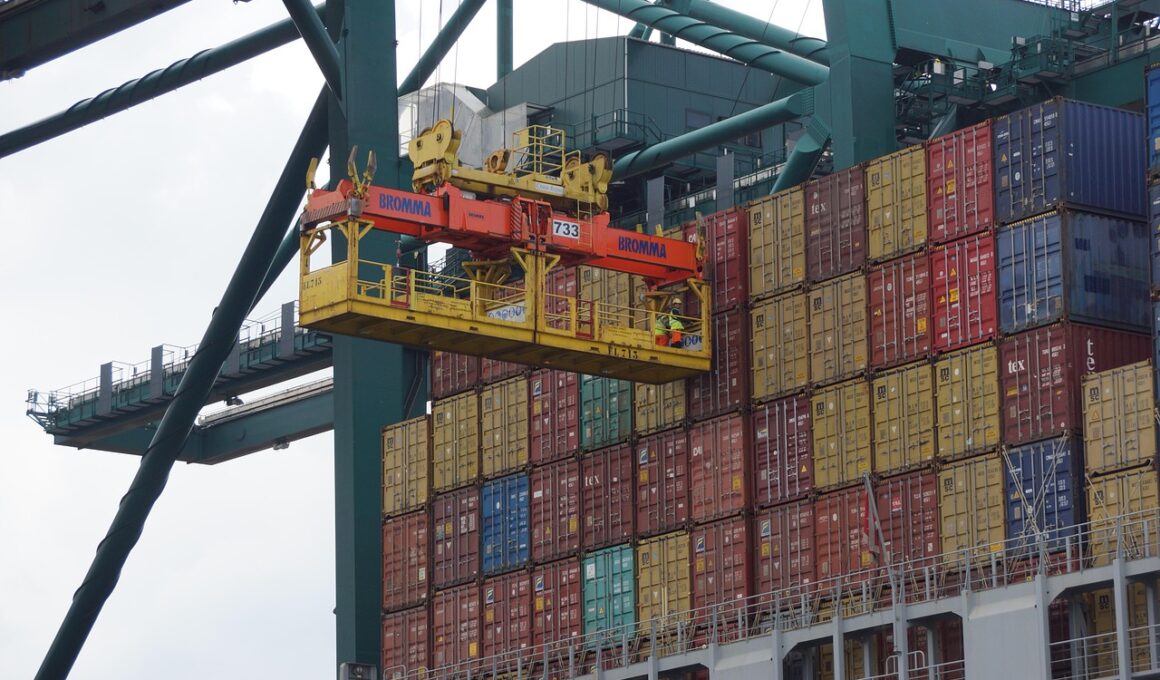Logistics and Transportation Challenges in Emerging Markets
Emerging markets present distinct logistics and transportation challenges that significantly impact international trade. These challenges arise from infrastructure deficiencies, regulatory hurdles, and unpredictable market conditions. Many emerging economies struggle with inadequate roads, insufficient railway networks, and lack of reliable airports, making the transportation of goods time-consuming and costly. Additionally, complex customs regulations and varying trade agreements can complicate the flow of goods across borders. Businesses seeking to capitalize on these markets must navigate varying bureaucratic processes, which often require extensive documentation and compliance with local laws. This can lead to delays that affect market competitiveness. Furthermore, fluctuating currency values and exposure to global economic shifts add another layer of complexity for businesses relying on punctual logistics. The unpredictability of supply chains can lead to inefficiencies, further complicating access to these burgeoning markets. Companies involved in international trade must invest in building robust relationships with local partners and understanding the specific logistics landscapes. By adopting strategies tailored to tackle these unique challenges, firms can better position themselves to thrive in emerging markets, ultimately driving growth and enhancing global trade networks.
To effectively capitalize on opportunities in emerging markets, companies must be aware of logistics infrastructure limitations. For example, in many regions, road quality may be poor, impacting the efficiency of transportation. Cargo delays can arise due to unpaved roads, and frequent repairs are needed. Furthermore, in some countries, port facilities might not have the capacity to handle increased shipping volumes, leading to congestion and halting trade flow. Emerging markets often face challenges related to energy supply, influencing logistics operations in rural areas, where electricity is limited. Moreover, insufficient safety regulations can lead to goods being damaged while in transit. These infrastructural issues highlight the need for comprehensive planning and investment in logistics systems, which involve understanding local contexts. It is crucial for companies to form partnerships with local transport firms that know the terrain. Investing in technology also plays an important role, as it can streamline logistics operations and improve tracking efficiency. Enhanced technology adoption will create more agile supply chains, allowing businesses to respond swiftly to challenges. Successfully navigating these logistical issues is key to optimizing operations in competitive emerging markets, fostering sustainable growth in international trade.
Navigating Regulatory Hurdles
Understanding and navigating regulatory challenges in emerging markets pose significant hurdles for logistics and international trade. Each country has its regulatory framework that governs the movement of goods, making it imperative for companies to stay informed about local requirements. Regulatory compliance issues can severely impact the efficiency of supply chains, causing delays that can diminish trade competitiveness. For instance, customs procedures can be lengthy and complicated due to varying import/export rules, requiring specialized knowledge. These bureaucratic processes often entail multiple steps, including inspections and certifications, resulting in extended lead times. Companies aiming to expand their operations into emerging markets must conduct thorough due diligence, ensuring they understand local regulations and compliance needs. Failing to comply with these regulations can lead to fines, shipment detentions, and damage to brand reputations. Therefore, firms should invest in local expertise to facilitate smoother operations while minimizing risks. Additionally, organizations can advocate for regulatory reforms that simplify processes and create a more business-friendly environment. Engaging in public-private partnerships may stimulate changes that benefit the overall logistics landscape, aiming to enhance trade efficiency.Read more about trade regulations here.
Security concerns also contribute to the logistics challenges faced by companies in emerging markets. Many regions experience high levels of theft, vandalism, and cargo loss, raising operational risks. Effective supply chain security measures are crucial to mitigate these risks, engaging both physical and digital strategies. Investing in advanced security systems can protect goods in transit and instill consumer confidence in the products being offered. Additionally, collaborating with local authorities to strengthen security protocols is essential. This includes reporting incidents and fostering relationships that promote safety. However, the costs associated with implementing security measures can strain operational budgets, particularly for small businesses. Thus, it is essential to balance security investments with overall logistics strategies. Another aspect to consider is the volatility in political landscapes that can affect trade and logistics operations. Businesses operating in unstable environments may face interruptions due to civil unrest or changing governmental policies. Developing adaptable logistics strategies that can respond to potential disruptions is critical. Building contingency plans and maintaining flexibility within supply chains will enable companies to navigate unexpected challenges while ensuring the continuity of operations in emerging markets.
Embracing Technology in Logistics
Technology plays a crucial role in addressing logistics and transportation challenges in emerging markets. The digital transformation of supply chains enables firms to streamline operations and enhance efficiency. Implementing software solutions for inventory management, transportation tracking, and communication can lead to significant improvements in logistics performance. These technologies allow businesses to better manage stock levels, improve order accuracy, and facilitate real-time tracking of shipments. Moreover, adopting data analytics can optimize route planning and enhance decision-making processes based on market insights. Emerging markets can benefit from these innovations by reducing operational costs and delivering goods more effectively. As logistics becomes increasingly interconnected, leveraging technology creates opportunities for better collaboration among stakeholders. Cloud computing platforms provide a centralized space for data sharing, while mobile applications enable communication across supply chains. Additionally, utilizing automation solutions within warehousing and distribution centers can further enhance productivity. While technology implementation may require substantial upfront investments, the long-term benefits of improved efficiency and reduced operational risks often outweigh the costs. Businesses willing to embrace digital solutions will position themselves favorably in the competitive landscape of emerging markets, thereby driving revenue growth and expanding their international reach.
Another key aspect is the need for workforce training and development in logistics and transportation sectors within emerging markets. Growing economies often lack personnel with the necessary skills to manage complex logistics systems, leading to operational inefficiencies. Investing in employee training programs can enhance workforce capabilities and align them with international standards. Companies must prioritize continuous education, keeping their employees informed about best practices and new technology. Creating partnerships with local educational institutions can aid in cultivating a skilled workforce tailored to industry needs. A well-trained workforce is essential for navigating regulatory landscapes, managing supply chain complexities, and utilizing technology effectively. Furthermore, engaging employees at all levels fosters a culture of innovation, encouraging individuals to propose alternative solutions for existing challenges. Companies that invest in their teams are likely to see improved productivity, reduced turnover rates, and enhanced competitiveness in the marketplace. This emphasis on talent development can play a vital role in driving overall growth in logistics operations. Emphasizing workforce training is therefore a strategic investment that can yield significant returns as businesses navigate the challenges inherent in emerging markets.
The Future of Emerging Markets
As emerging markets continue to evolve, it is essential for companies involved in international trade to remain agile and adaptable in their logistics strategies. The growth potential in these markets presents significant opportunities, but companies must also be prepared for the challenges that accompany this dynamic environment. Investing in infrastructure development, fostering partnerships with local stakeholders, and embracing technology will enhance competitive advantage. Continuous engagement with local governments to improve regulatory frameworks is also critical in simplifying logistics operations. Moreover, understanding consumer preferences and local demands can help tailor products to ensure market fit, which will enhance trade success. As global economic conditions shift, companies need to monitor and adapt to changing circumstances while maintaining strong communication within their supply chains. Focusing on sustainable practices and environmental considerations will also become increasingly important for remaining competitive in international trade. By prioritizing innovation and resilience, businesses can position themselves to succeed in the ever-changing landscape of emerging markets. Ultimately, those who proactively address logistics and transportation challenges will drive growth and contribute to the expansion of international trade.
In conclusion, tackling logistics and transportation challenges in emerging markets is essential for firms aiming to thrive in international trade. Each challenge requires a tailored approach and strategic investments to create efficient supply chain systems. Collaborating with local partners, utilizing advanced technology, and engaging in workforce training will enhance logistics performance. Moreover, being proactive in addressing regulatory issues and security threats is crucial for ensuring smooth operations. Companies that adopt innovative solutions and emphasize sustainable practices will find themselves well-positioned to capture opportunities in these growing economies. As emerging markets continue to gain prominence in international trade, the importance of effective logistics cannot be overstated. Businesses must remain agile, adaptive, and willing to constantly learn from their experiences in these complex environments. This thoughtful approach will lead to improved outcomes based on careful market analysis and strategic planning, ultimately driving success in international markets. By focusing on these key aspects, firms can establish a strong foundation for long-term growth and sustainable development, allowing them to navigate the unique circumstances of emerging markets with confidence. The future of international trade hinges on effective logistics management, promoting economic growth and collaboration across borders.


